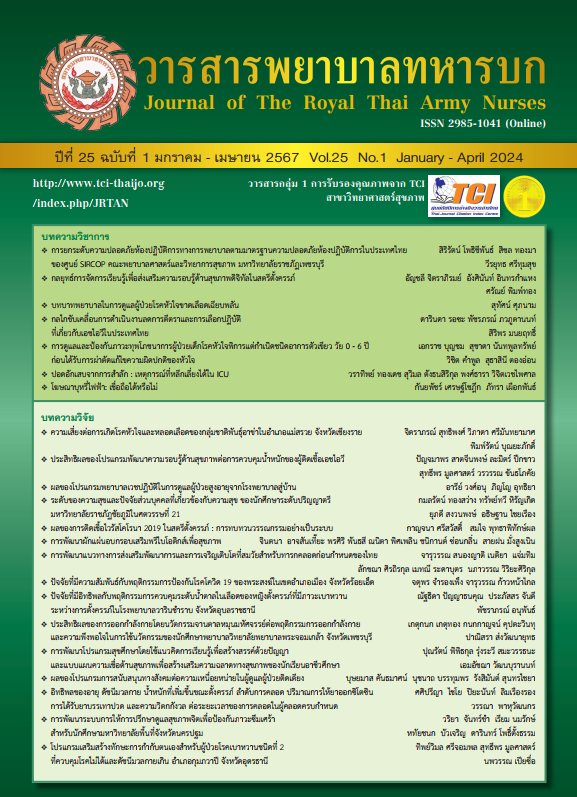Development of Health Education Program Based on Constructionism Concept and Health Belief Model for Enhancing Health Literacy on Health Quotient of Vocational Education Students
Keywords:
Development of Health Education Program, Constructionism Concept, Health Belief Modely, Health LiteracAbstract
The purposes of this study were to 1) develop a Health Education Program 2) study the effectiveness of this Health Education Program. The participants purposive sampling were 70 vocational education students divided into 2 groups of 35 students, an experimental and a control group. The process of experiment took 8 weeks with 2 periods a week, and 60 minutes per period. The research instruments were health education program and health literacy questionnaire of the content validity assessed by 5 experts. The statistics used in data analysis for pretest and posttest were mean, standard deviation (S.D.) and t-test.
The results of the research were as follows: 1) The developed health education program. For learning management process, 2 components were organized (1) learning activity management in accordance with 4 steps (information sharing, connecting experiences, constructing works and reflection of learning and presenting their works) by arranging 8 learning activities including principles of using health products, risk factors from health products, health literacy from health products, health products and our body, why using health products?, get away from unhealthy products, don’t let’s unhealthy product into our life, and self-care of health products ; and (2) learning experience management in the areas of exhibition and guidance of health products. 2) After participating the program, health literacy mean scores of the experimental group were found significantly higher than before participating the program at the very good level and health literacy mean scores of the experimental group were also found significantly higher than the control group at .05 level.
Downloads
References
Office of Disease Prevention and Control 8, Udon Thani Province. Report on the Operation of the Health Product safety Surveillance Center Region 8, Udon Thani Province. Udon Thani: Health Product safety Surveillance Center Region 8, Udon Thani Province. 2018. (in Thai).
Khampisut J. Health Literacy and Health Promotion Behaviors of Students in Naresuan University. Journal of Educational Measurement Mahasarakham University. 2018; 24(1): 67-78. (in Thai).
Khumphisut J. Health Quotient and Health Enchancing Behavior students of Naresuan University. Journal of Educational Measurement Mahasarakham University. 2018; 24(1): 67–78. (in Thai).
Netrthanon S. The Process Of Enhancing Critical And Creative Thinking Skills Through Constructionism Learning Theory. Interdisciplinary Sripatum Chonburi Journal. 2020; 6(3): 20-31. (in Thai).
Mancuso J M. Assessment and Measurement of health literacy: An integrative review of the literature. Nursing and Health Sciences. 2009; 11(1): 77-89.
Druin A. & Solomon C. Designing multimedia environments for children: Computers, creativity, and kids. New York, NY: John Wiley & Sons. 1996.
Intarakamhang U. Health literacy: Measurement and development. Bangkok: Sukhumvit Printing Company Limited. 2017. (in Thai).
Kaeodumkoeng K. Health literacy access, understand and appliction. Bangkok: Amarin Book Center Co., Ltd. 2018. (in Thai).
Phetphum C. health behavior: concepts theories and applications. Phitsanulok: Naresuan University Publishing House. 2017. (in Thai).
Health Education Division. Survey results : Health Literacy among youth aged 12-15 years. Bangkok: Health Education Division Department of Health Service Support Ministry of Public Health. 2001. (in Thai).
Wayo W., et al, The Effects of Health Literacy Enhancement Program on Health Literacy and Prevention Behavior of Hypertension among Community–Dwelling Older Adults. 2023; 24(1): 43-52. (in Thai).
Edwards M., Wood F., Davies M., & Edwards A. The development of health literacy in patients with a long-term health condition: the health literacy pathway model. Bio Med Central Public Health. 2012; 12(1): 130-44.
Ministry of Education Office of the Vocational Education Commission. Vocational Certificate Program, 2019. (in Thai).
Samyaron W. The Development of Creative Learning Skill Through Multimedia Learning Media Using the Principles of Constructivism to Raise Learning Competencies for Developing Learning Skill in the 21st Century of Students in Elementary Schools, Phayao Provine. Journal of Education Prince of Songkhla University Pattani Campus. 2020; 31(1): 99-109. (in Thai).
Thienphuridej T. & Fangpong N. The Effect of the Health Promotion Program of Thin Pre-School Children on Nutritional Care Behavior among Caregivers. Journal of The Royal Thai Army Nurses. 2023; 24(1): 318-26. (in Thai).
Wattanaburanont A. Health Principles. Bangkok: Odeon Store. 2013. (in Thai).
Downloads
Published
How to Cite
Issue
Section
License
Copyright (c) 2024 Journal of The Royal Thai Army Nurses

This work is licensed under a Creative Commons Attribution-NonCommercial-NoDerivatives 4.0 International License.
บทความหรือข้อคิดเห็นใดใดที่ปรากฏในวารสารพยาบาลทหารบกเป็นวรรณกรรมของผู้เขียน ซึ่งบรรณาธิการหรือสมาคมพยาบาลทหารบก ไม่จำเป็นต้องเห็นด้วย
บทความที่ได้รับการตีพิมพ์เป็นลิขสิทธิ์ของวารสารพยาบาลทหารบก
The ideas and opinions expressed in the Journal of The Royal Thai Army Nurses are those of the authors and not necessarily those
of the editor or Royal Thai Army Nurses Association.






